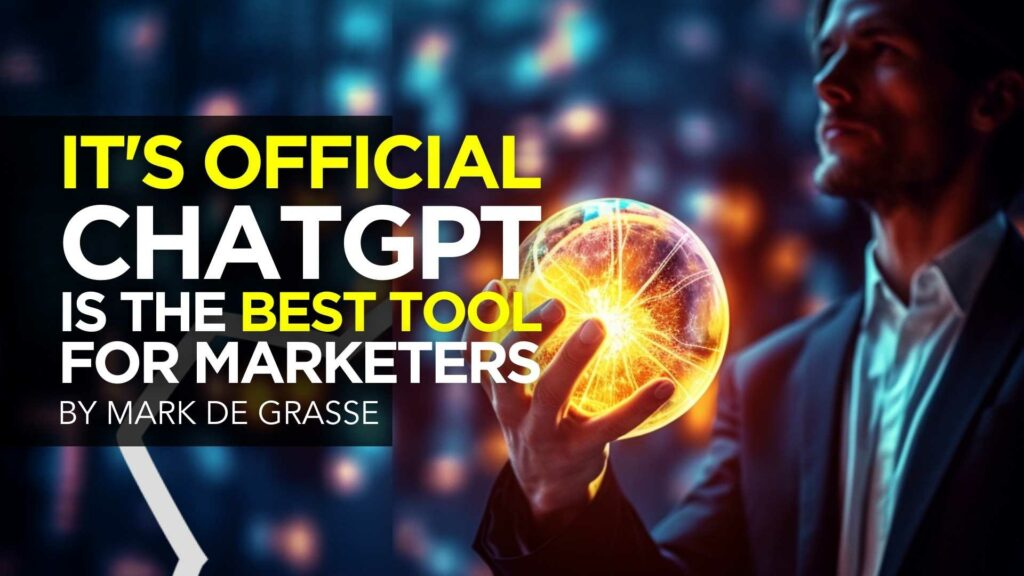
Artificial Intelligence is a game changer for marketing. While AI will be useful in many industries, the nature of the marketing profession makes it even more powerful, from the need for constant content generation, to ideation for advertising concepts, to automation for day-to-day operations, AI is the biggest innovation in marketing since the internet.
Since the beginning of 2023, the amount of AI tools for marketing has exploded.
While there’s no official count of new AI applications since the beginning of the year, if you monitor websites like TheresanAIforThat.com, you’ll find dozens to hundreds of new applications being added every day, with the current list including 4,600+ apps covering over 1,300 tasks.
Further, the investment in new AI companies has rapidly expanded. According to the International Data Corporation (IDC), investments in AI software, hardware, and software for AI-centric systems will increase 26.9% to $154 billion in 2023 over 2022, with $300 billion expected by 2026 (SOURCE).
In 2021, the investment in AI doubled globally from less than $40 billion to almost $80 billion (SOURCE), and look what has come from that!
Needless to say, there are many, many choices when it comes to AI applications, and it can be difficult to nail down which ones to use, much less which ones you should focus on.
After discussing the topic for dozens of marketing professionals and AI experts, I’ve come to a simple conclusion: marketers should master ChatGPT BEFORE anything else.
Here I’ll explain why.
Why Marketers Need to Focus on AI Skill Development
Marketers are notorious for falling prey to “shiny object syndrome.” It’s no surprise why… the easiest person to get sold is a salesman after all!
There are always new methods, platforms, techniques, tricks, tips, and tools to make your marketing faster, better, and more effective. Every company needs marketing to succeed, and the impact of good marketing can make or break your organization.
AI is the shiniest object of all for marketers…
Here’s why AI is such a vital development in the marketing industry:
Ideation: Marketers and marketing agencies may have to create multiple concepts for content and advertising for each client every day. This need for volumes of creativity was time consuming and tiring, but with AI the process has become 10 times easier. No more lag time between needing to brainstorm and creating new concepts… AI makes it almost instant.
Volume Creation: In addition to massive amounts of new concepts and ideas, AI also provides the ability to create brand-specific content whenever necessary. By “training your AI” to create content based on a particular style, marketers can create new advertising copy, landing page headlines and text, email drip campaigns, social media descriptions, lead magnet materials, and much more 10 times faster than before.
Personalization: With AI, marketers unlock the power of personalized experiences on a large scale. By leveraging data analysis and machine learning, AI comprehends individual preferences, behaviors, and purchase patterns. Marketers can then tailor their messaging, recommendations, and offers to each customer, creating engaging interactions that drive conversions.
Data-driven Insights: AI’s ability to swiftly and accurately process vast amounts of data empowers marketers with valuable insights. They can delve into customer behavior, market trends, and campaign performance. AI-driven analytics tools offer actionable recommendations based on data, enabling marketers to make informed decisions and optimize strategies for superior outcomes.
Customer Support & Chatbots: AI-driven chatbots and virtual assistants provide instant and personalized customer support. They excel at handling customer inquiries, offering product recommendations, and facilitating purchase decisions. Available 24/7, AI chatbots enhance response times and boost customer satisfaction by delivering prompt and relevant assistance.
Predictive Analytics: AI algorithms leverage historical data to predict future outcomes, empowering marketers to anticipate customer needs and behavior. Predictive analytics aids in optimizing marketing campaigns, identifying high-value customers, and forecasting sales trends. With these insights, marketers can allocate resources effectively and enhance overall campaign performance.
Automation & Efficiency: By automating repetitive and time-consuming tasks, AI liberates marketers to focus on strategic endeavors. AI-powered tools automate email marketing, social media scheduling, content generation, and data analysis. This streamlined automation boosts efficiency, productivity, and eliminates manual effort.
Competitive Advantage: Marketers gain a competitive edge by harnessing the potential of AI. AI-powered tools enable advanced market research, competitor analysis, and trend forecasting. By staying ahead of industry developments, marketers can make proactive decisions that differentiate their brand and seize opportunities for success.
With all that said, you will severely limit your ability to use AI if you bounce around from application to application. That’s why you need to get focused.
Why You Need to Limit the Amount of AI Applications You Use
While AI may be new to the marketing profession, the need to focus on a particular set of skills has been around since the dawn of the position.
Skills like copywriting, product positioning, data analysis, customer service, communication, networking, adaptability, and innovation are keystones to the professional marketer.
The ability to utilize AI is just the latest one.
I’ve found that the principle of minimalism allows for the quickest development of new skills. Unfortunately, trying to learn how to use a dozen new tools goes against this philosophy… you need to limit the number of new applications if you really want to master one.
Here’s why the principle of minimalism applies to AI skill development:
Intentionality: In the world of minimalism, intentionality reigns supreme. It urges individuals to deliberate and question whether they truly require an array of specialized tools or if a single tool can serve their needs just as well. By consciously evaluating the functionality and purpose of each tool, you can make mindful decisions that align with their specific requirements.
Simplification: Minimalism champions the art of simplification, both in life and possessions. By minimizing the number of tools and opting for multi-functional alternatives, you can declutter your tool collection, streamline their workflow, and eliminate unnecessary complexities. Embracing simplicity allows for a more efficient and unencumbered approach.
Functionality over Excess: Minimalism urges us to prioritize functionality above all else. Instead of amassing an abundance of tools for each specific task, the focus shifts towards identifying a versatile tool that can effectively serve multiple purposes. By valuing functionality over excessive accumulation, minimalism fosters efficiency and resourcefulness in our endeavors.
Mindful Consumption: At the heart of minimalism lies the principle of mindful consumption. Rather than succumbing to impulsive or societal pressures, minimalism encourages you to consciously evaluate your needs. By carefully considering the necessity of each tool and making choices aligned with those needs, we reduce excessive consumption and wastefulness. Mindful consumption promotes a more intentional and sustainable way of living.
With all that said, there’s many reasons why ChatGPT is the marketers-choice for AI skill development.
Why Marketers Should Focus on ChatGPT
Yes, there are newer and more specific AI tools out there, but ChatGPT is still the standard when it comes to marketing, and for good reason.
The following is just a few of the reasons why the use of ChatGPT should be a primary focus of marketers.
Conversational Superpower
ChatGPT possesses unparalleled conversational superpowers that elevate customer engagement to new heights. With its natural language processing capabilities, ChatGPT can simulate human-like interactions, leading to more personalized and meaningful conversations with customers.
Marketers can harness this power to provide tailored recommendations, answer queries promptly, and build strong connections that foster brand loyalty.
Further, marketing is one of the few areas of business where a conversational style is more effective than technical communication styles, making ChatGPT ideal for this type of content generation.
Versatile Marketing Applications
ChatGPT’s versatility empowers marketers to excel across multiple marketing applications. Whether it’s content creation, customer support, lead generation, or even social media management, ChatGPT delivers exceptional performance.
Marketers can leverage ChatGPT to generate engaging blog posts, automate personalized email campaigns, and handle customer inquiries efficiently—all from a single AI tool.
Better yet, as marketers utilize ChatGPT they’ll start to define their prompting style, creating more and more content from less prompts.

Are You Ready to Master Social Media?
Become a Certified Social Media Specialist and learn the newest strategies (by social platform) to draw organic traffic to your social media sites.
Standardized Brand Voice for Unlimited Companies
With ChatGPT as their exclusive AI tool, marketers gain a profound advantage in crafting hyper-targeted campaigns that utilize a consistent brand voice.
ChatGPT’s ability to understand individual preferences, behaviors, and purchase patterns allows for laser-focused messaging. Marketers can tailor their content and offers to resonate with each customer on a deeper level, resulting in improved engagement, higher conversions, and increased ROI.
Since marketers often focus on more than one company or client at a time, ChatGPT allows for continuous content development through individual chats that maintain the organization’s brand voice without the need for a technical account set up each time. It doesn’t care how many clients you take care of, meaning both cost and time savings.
Continuous Learning & Improvement
ChatGPT’s continuous learning capabilities enable marketers to stay ahead of the curve. Through ongoing training and exposure to real-world data, ChatGPT adapts and evolves to meet changing customer needs and industry dynamics.
Marketers can capitalize on this adaptive learning to refine their strategies, optimize campaign performance, and drive continuous improvement.
Dependable Development & Longevity
Few, if any, companies have spent more money or received more investment than OpenAI, the developer of ChatGPT. Microsoft has invested over $13 billion in the company to date (SOURCE), and with a valuation of $29 billion, OpenAI won’t be disappearing any time soon.
Further, with over 100 million users and an expected revenue of $1 billion by 2024, the company is strong and growing (SOURCE). If any company will lead the way in consolidating smaller companies with similar solutions, it’s this one.
How to Develop Your ChatGPT Marketing Skills
ChatGPT is like a hammer. In the hands of someone who doesn’t know what they’re doing, it can still be useful, but in the hands of a carpenter, it becomes something transformative.
That’s why the second cohort of DigitalMarketer’s AI-Powered Marketer Accelerator is focused exclusively on ChatGPT. If you want to learn how to employ the most powerful frameworks built by DigitalMarketer over the last dozen years, while also using AI to make the process faster than ever, you need to attend.





